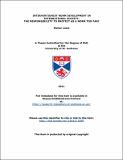Files in this item
Interventionist norm development in international society : the responsibility to protect as a norm too far?
Item metadata
| dc.contributor.advisor | Taylor, Ian | |
| dc.contributor.author | Lotze, Walter | |
| dc.coverage.spatial | 167 | en_US |
| dc.date.accessioned | 2011-05-31T11:57:09Z | |
| dc.date.available | 2011-05-31T11:57:09Z | |
| dc.date.issued | 2011-06-21 | |
| dc.identifier.uri | https://hdl.handle.net/10023/1850 | |
| dc.description.abstract | This research makes use of a Constructivist approach to norm development, in particular the concept of the norm life cycle, to assess the emergence and development of the responsibility to protect as a norm in international society in relation to the conduct of interventions on humanitarian grounds. This study finds that the responsibility to protect emerged relatively rapidly in international society as a norm relevant to the formulation and implementation of international responses to conflict situations characterised by the commission of atrocity crimes. Indeed, between 2001 and 2010, this study finds that the responsibility to protect norm became codified and entrenched in international organisation, and could therefore have been expected to influence state behaviour, and the discourse surrounding that behaviour, in relation to the conduct of interventions on humanitarian grounds. However, through an assessment of the application of the norm through the United Nations and the African Union to the conflicts in the Darfur region of Sudan from 2003 onwards, the study finds that the norm, while featuring relatively prominently in discourse surrounding Darfur between 2007 and 2008 in the United Nations, appears to have receded thereafter, disappearing from discourse by 2009 altogether, and appears not to have been useful to the attainment of its content goal, namely preventing or halting the commission of atrocity crimes, in the case of Darfur. Indeed, the norm may even have contributed to complicating, as opposed to facilitating, international engagement on Darfur. This study explores the apparent contradiction between the emergence and entrenchment of the responsibility to protect norm in international society at the same time as the norm appears to have increasingly faded from discourse surrounding international responses to the conflicts in Darfur, and assesses the implications of this both for the future development and utility of the norm, as well as for future responses to conflicts characterised by atrocity crimes on the African continent. | en_US |
| dc.language.iso | en | en_US |
| dc.publisher | University of St Andrews | |
| dc.subject | Responsibility to protect | en_US |
| dc.subject | Norms | en_US |
| dc.subject | Darfur | en_US |
| dc.subject | African Union | en_US |
| dc.subject | United Nations | en_US |
| dc.subject | Protection of civilians | en_US |
| dc.subject | Humanitarian intervention | en_US |
| dc.subject | Intervention | en_US |
| dc.subject.lcc | JZ6368.L7 | |
| dc.subject.lcsh | Intervention (International law) | en_US |
| dc.subject.lcsh | Humanitarian intervention--Sudan--Darfur | en_US |
| dc.title | Interventionist norm development in international society : the responsibility to protect as a norm too far? | en_US |
| dc.type | Thesis | en_US |
| dc.type.qualificationlevel | Doctoral | en_US |
| dc.type.qualificationname | PhD Doctor of Philosophy | en_US |
| dc.publisher.institution | The University of St Andrews | en_US |
This item appears in the following Collection(s)
Items in the St Andrews Research Repository are protected by copyright, with all rights reserved, unless otherwise indicated.

